Illinois Senate approves $50 billion budget, now heads to the House
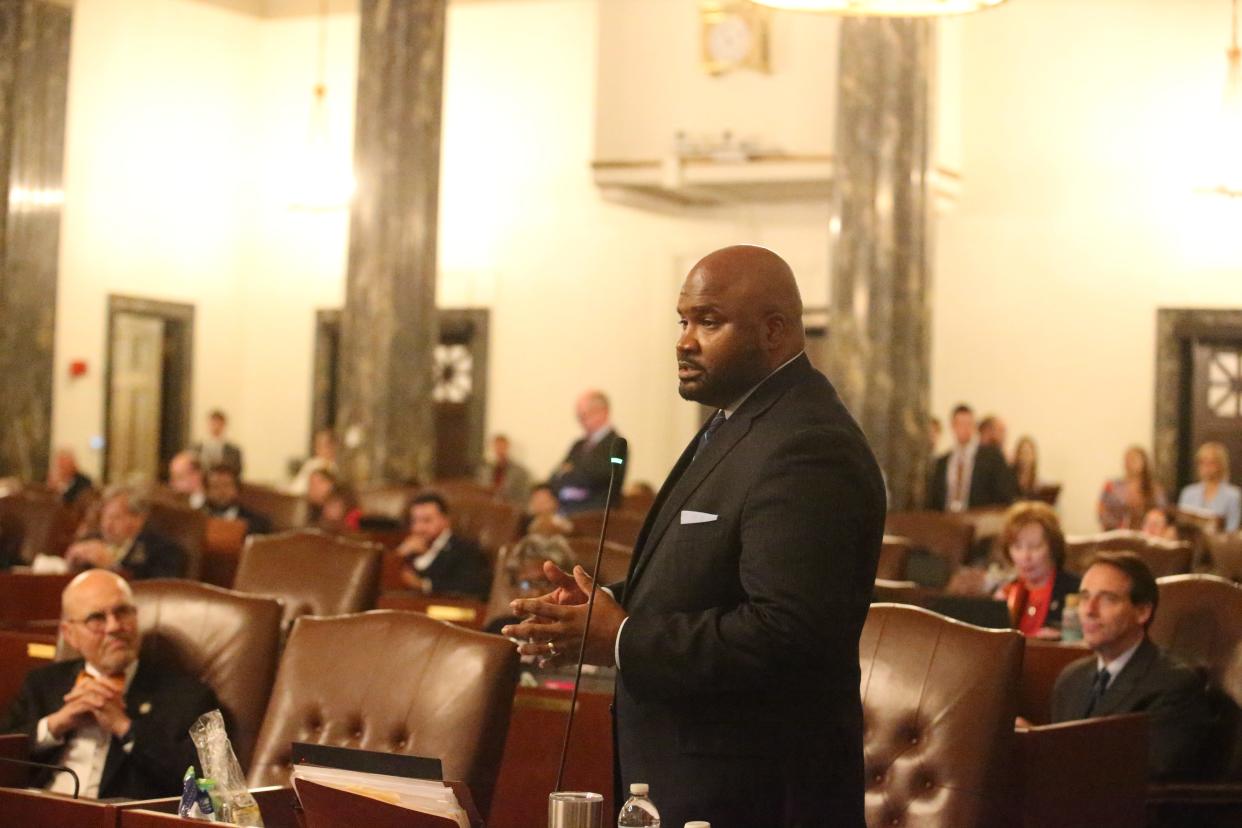
- Oops!Something went wrong.Please try again later.
- Oops!Something went wrong.Please try again later.
The Illinois Senate approved the fiscal year 2024 budget late Thursday night, now sending a two-bill package on to the House and providing a clearer picture as to when the spring session may finally end.
In its totality, the budget language seen in an amendment filed to Senate Bill 250 included more than 3,400 pages and has revenue estimates exceeding $50.7 billion while expenditures topping $50.6 billion for the fiscal year starting on July 1. This revenue number surpasses recent figures from the Governor’s Office of Management and Budget by more than $300 million and approximately $1 billion more in expenditures than the governor's proposed budget from February.
The first budget bill from Senate Democrats' lead budgeteer Sen. Elgie Sims, D-Chicago, dropped a little after 9 p.m. on Wednesday. The Budget Implementation Bill, the needed budget complement, came Thursday afternoon under amendments to House Bill 3817 - a bill originally devised to establish the soybean as the state bean.
Democrats and Republicans alike had been complementary of the work of Sims, yet any notion of a bipartisan vote was quickly squashed. No members of the minority party supported either of the budget bills, some of which received 'no' votes from Democrats.
SB 250 passed 34-22 and HB 3817 passed 36-20. Sen. Doris Turner, D-Springfield was one of three Democrats voting against the former, while Sen. Patrick Joyce, D-Essex, was the sole Democrat voting 'no' on both bills.
The primary reason Republicans rose in opposition was due to the exclusion of the state’s $75 million tax credit program that supports private school scholarships. Created in 2017, the Invest in Kids program is set to expire on Jan. 1, 2024 without any expansion.
A possibility remains for a continuation of the program during the fall veto session, but Sen. Chapin Rose, R-Mahomet, said the decision to not act now will have major ramifications in the upcoming school year. Sen. Sue Rezin, R-Morris, called the exclusion a "missed opportunity" by lawmakers.
"Parents, this summer, are gonna have to decide are they going to send their kids to school that they can maybe afford for half a year and then get thrown out," Rose, a GOP budgeteer, said during a hour-plus floor debate on SB 250. "Are they going to put their faith in the Illinois General Assembly to finally figure it out?"
More General Assembly: Harmon bill ending 'venue shopping' for constitutional challenges passes Senate
Democrats stood by their bill as one they felt reflected the shared priorities of Illinoisans. Senate President Don Harmon noted that these investments, whether they be in schools, hospitals, and more will touch all districts regardless of political leaning.
Both Harmon, D-Oak Park, and Senate Republican Leader John Curran, R-Downers Grove, voiced support for an improved budget discussion process. No bipartisan votes, however, was a disappointment to Harmon.
"We invited the other side of the aisle to the table, we will continue to stretch out our hand," Sims added during closing remarks. "We want your partnership, but we need your partnership to be transparent and authentic. And when it is not, we will do it without you."
Last Friday was the originally scheduled adjournment day for the spring session, yet, with disagreement on how to fund the state's health care program for undocumented immigrants, no budget package was ready. The governor's February proposal included $220 million towards the program, but recent estimates from the Illinois Department of Healthcare and Family Services indicated that would not be nearly enough.
The new sum provided by IDHFS Director Theresa Eagleson earlier this month was $1.1 billion, or nearly $900 million exceeding the original estimate. A program enacted and since expanded since its 2020 beginning, the Health Benefits for Immigrant Adults program provides healthcare similar to Medicaid for noncitizens 42 years and older and those with green cards living in the state for less than five years.
Gov. JB Pritzker said a deal had been reached on the program on Wednesday that would "give us the tools to manage the program properly." Sims confirmed on Thursday that this year's funding will be approximately $550 million.
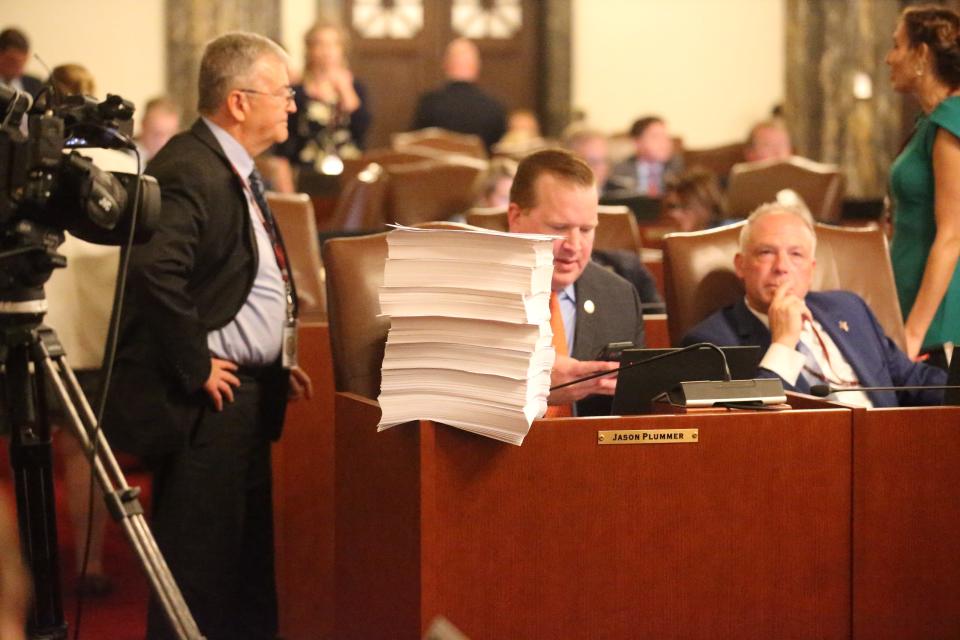
"We're continuing the program going forward, but in a budget friendly way so that everybody gets the health care that they need," the governor said.
Pritzker's big ticket items mostly make final bill
Pritzker, joined by Harmon and House Speaker Emanuel "Chris" Welch, announced the budget agreement earlier on Wednesday at his Capitol office.
While coming later than originally planned, the trio claimed they presented a united front on the budget which had many of the same provisions included in Pritzker's earlier proposal. The governor had particularly emphasized preschool through college education funding during his State of the State address, later touting the program during a statewide advocacy campaign.
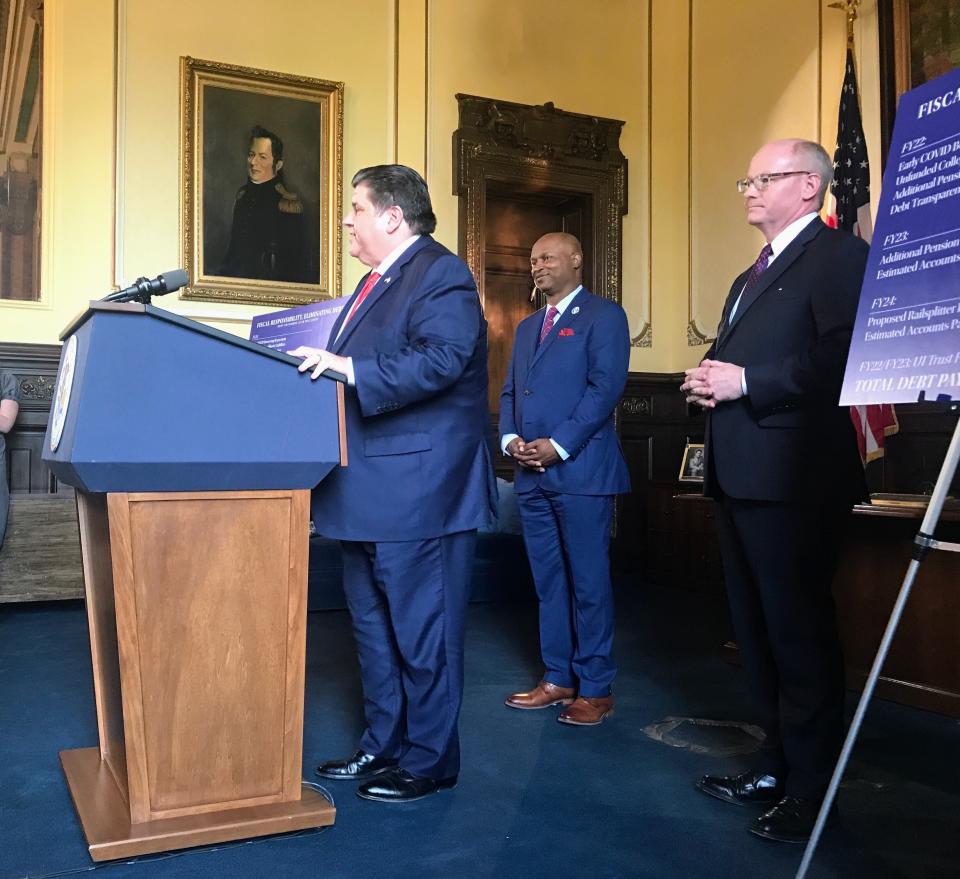
Among those included in the budget was $250 million towards the first-year of the Smart Start Illinois initiative, a plan which seeks to provide universal preschool access by 2027 and address childcare deserts throughout the state while improving the pay for childcare workers.
Related: Education legislation takes center stage in General Assembly
Other education initiatives include a $1.6 million to launch the Dolly Parton's Imagination Library program statewide and two $100 million increases to overall public university and community college funding and Monetary Award Program grant funding for college scholarships.
Outside of education, an investment of more than $350 million will go towards the Home Illinois program - the state's plan to address homelessness - and another $20 million will head to the Illinois Grocery Initiative, which provides funds to tackle food deserts in rural, suburban, and urban communities.
The Illinois General Assembly took action on the latter earlier this session by passing Senate Bill 850, creating the initiative. Several Republicans including Rep. Mike Coffey, R-Springfield, supported the bill before passing in an unanimous concurrence Senate vote last week.
Yet, some such as Rep. Martin McLaughlin, R-Barrington Hills, voted 'no' due to what they felt was government overreach in private business.
“I understand the intent, we want to help those that need to be served, however, there are much better ways to do it than putting the future taxpayer on the hook of Illinois, and having the government run grocery stores is an absolute, horrendous idea,” McLaughlin said.
Related: Budget discussions carry-on. What are Springfield legislators' priorities?
Of local note, the budget also includes a $200 million pension payment beyond what is required by law and nearly $75 million to the Department of Children and Family Services to hire 192 workers, expand training and protection, increase scholarships for youth in care, and improve facilities.
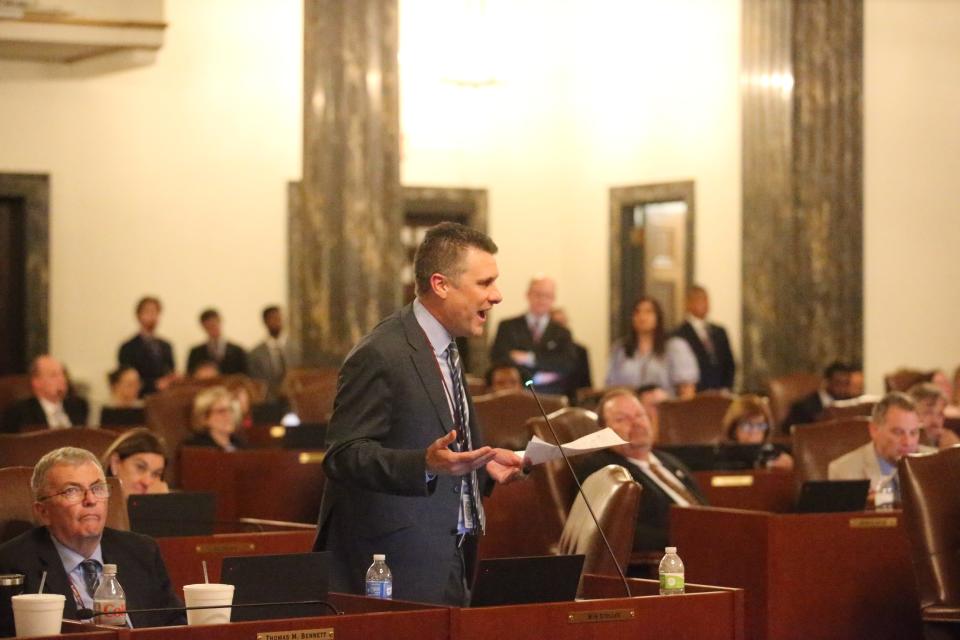
Total pension investment will be $10.2 billion, which is still less than the $14.4 billion needed each year according to Sen. Win Stoller, R-Germantown Hills.
The BIMP lists several new appropriations for Springfield and Sangamon County, perhaps none more significant than a $50 million grant for the "costs associated with planning and design of a new legislative building and related planning and design costs for demolition of the Stratton Office Building."
Other funds dedicated to the area include a $3 million grant to the University of Illinois Springfield's Illinois Innocence Project, a $1.5 million grant to Sangamon County for capital improvements and a $350,000 grant to to the Springfield Eastside Recreation Center to construct a new building.
Not quite what they wanted
Competing interests rallied in the Capitol throughout session to advocate for their budget needs. With many mouths to feed and limited funds to go around, several groups will receive less than desired.
Pritzker noted that "adjustments" were made from his original budget, but that no major overhauls were included in the current legislation.
"I think the important thing to note is that we were conservative to begin with," he told reporters, keeping expenditures within check of estimated revenues. "I'm pleased to say that this is not just a balanced budget, this is a good budget that funds the things that are priorities for my administration that were in the original introduced budget and includes things that the House and Senate wanted to increase or add to it."
Education groups, as mentioned above, received much of what was included in the proposed budget but also saw multiple initiatives either be reduced or below their funding goal.
Down $25 million from the original proposal, the budget package included $45 million for the first-year of a three-year teacher pipeline project. Additionally, the governor proposed $100 million in general revenue funds for capital developments at early childhood centers, a spending amount that has decreased to $50 million under the new agreement.
A provision staying the same is the $350 million into the state's evidence-based formula for K-12 public schools. This being the minimum annual investment, however, several groups had urged for increased funding.
The Center for Tax and Budget Accountability supported a $150 million increase to this year's sum dedicated to the formula, bringing the total to $500 million. CTBA says in its report the increase is needed to fully-fund the initiative by 2031, shaving off seven years under the current track.
Other pushes in the lead-up to the budget included one from municipal leaders across the state to increase the funding it receives through the Local Government Distributive Fund. The goal of the Illinois Municipal League and Chicago Mayor Brandon Johnson among others was to fully restore the share local governments receives through state income tax collections to 10% instead of the current 6.16%.
Even prior to a budget bill being introduced, IML felt it was unlikely that this goal would not be achieved in the upcoming fiscal year. Sims said during committee that this year's transfer will be $112.5 million, bringing the LGDF share to 6.47%.
Former mayor and now Sen. Don DeWitte, R-St. Charles, still thought that funding was insufficient.
"We can't even give them enough money to cover the cost of living increase," he said.
Both the Illinois Association of Rehabilitation Facilities and Illinois Coalition Against Sexual Assault also said the budget was not to par with their advocacy goals.
For IARF, they had called for $4 an hour wage increase for direct service professionals who work with people with intellectual and developmental disabilities. The budget, as it stands currently, only bumps DSPs pay by $2 instead of the originally proposed $1.50 increase. Sims, however, told the committee that an amendment is likely which will make the wage increase $2.50 per hour.
“We regretfully must oppose this and any other state budget proposal that includes a proposed wage structure for our frontline workers that will not meet their needs and leave our workforce crisis intact," IARF president and CEO Josh Evans said in a statement.
ICASA CEO Carrie Ward said the budget did not improve on the governor's original $7.69 million dedicated to the 31 rape crisis centers in Illinois. The need for an $12 million increase from the state was due to an expected reduction in federal Victims of Crimes Act funding, which has supported nearly two-thirds of statewide sexual assault services in recent years.
"We have never asked for an increase of this size - $12 million, but without it, Illinois survivors and communities will pay the price." Ward said during committee testimony.
What's next?
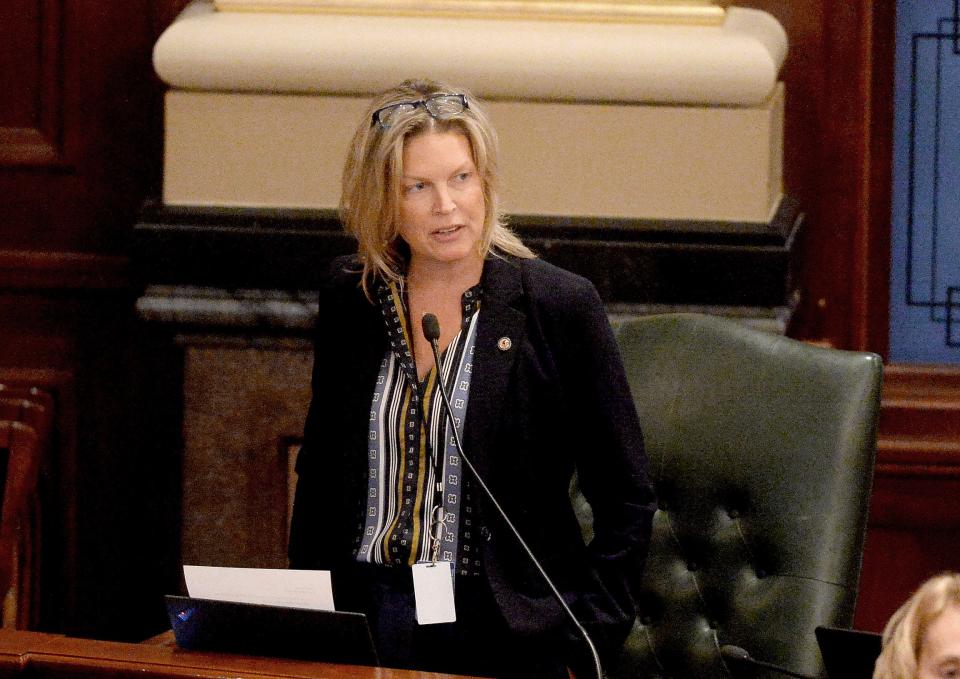
Approval of the budget in the Senate now sends it on to the House for a vote as early as Saturday before the governor could sign the package into law. If the House makes any amendments, the budget would have to return to the Senate for a concurrence vote but Harmon said on Wednesday an agreement had been made that no such amendments will happen.
The House had scheduled its final day of session on Friday, but due to the delayed Senate vote, it will likely have to move its budget vote back later as well. If a vote does not take place over the weekend, the chamber would have until May 31 to pass it before a three-fifths voting majority would be required.
House Minority Leader Tony McCombie, R-Savanna, in a statement expressed opposition to the budget not including many of hers and fellow Republicans' spending priorities that are shared with the majority party. Many bills have been filed this year that would make changes or outright repeal the estate tax, but no action has followed.
"Today we learned from Governor Pritzker and Democratic leaders that our shared priorities are not included," she said. "I am incredibly disappointed for Illinois families.”
Contact Patrick Keck: 312-549-9340, pkeck@gannett.com, twitter.com/@pkeckreporter.
This article originally appeared on State Journal-Register: Illinois Senate approves $50 billion budget, now heads to the House

